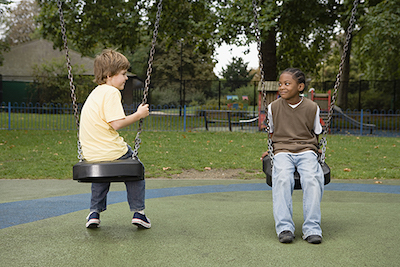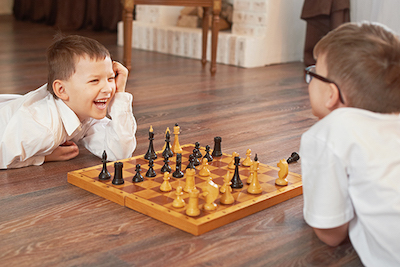How (and why) to help your child make friends
I used to think that having an infant was the most difficult time for a mother. I thought once I got my kids eating solid food, pooping in the potty and ready to go to school, that my job would be smooth sailing from there.
Pretty sure I was wrong about that one.
In fact, this topic came up when I was talking with a friend of mine who has grown children. She looked at me with equal parts sympathy and amusement and said, “I hate to tell you this, but it doesn’t actually get easier.”
I found this nearly unbelievable, so I started asking other mothers with children of all ages. Yep, they agree. There is no easy stage of mothering.
Another friend explained it this way.
“As your kids get older, it does get physically easier. But you still love them as much when they’re bigger as you did when they were little, yet you have less and less control over what they do and what happens to them, and that is really hard.”
As children grow older, parenting transitions from physical care-taking- changing diapers and wiping snotty noses- to the more intangible matters of the heart- helping them figure out who they are and where their place in the world will be.
And as a newly-minted mother of a kindergartener, this shift is happening quickly for me. My daughter has a whole new world that I don’t really know much about, and she is learning to navigate it on her own terms. One of the things I’ve noticed that plays a big role in her experience of life outside of our family is this: friendship.
Why the ability to make and manage friendships is so important
The ability to form and maintain friendships is an important quality to learn in early childhood. It isn’t just about fun and games. Research shows that a child’s ability to participate in friendships correlates with their self-esteem and self-image, affects whether they will be more susceptible to things like depression and anxiety, and is a vital component of personal growth and emotional maturity as they enter adolescence and adulthood.Studies even show that the presence of a best friend can help minimize the negative effects of difficult life situations for a child. When parents get divorced, when a child is struggling academically or when navigating personal conflict, having a good friend who cares and listens can help a child cope.
It doesn’t mean that they need to be the most popular kid in school or have dozens of friends. If your child tends to be reserved or introverted, that’s okay. Having even one or two close friends helps a child feel understood and accepted, and that’s what’s important.
But what do we do if our child struggles to make friends? Research has shown that to a certain degree, making successful friendships is a learned skill. If your child is having difficulty, there are things you can teach them that will help.
Some things to consider when helping your child build friendships
I’ve noticed that many of the kids I see struggling to make and keep friends also have parents who aren’t actively engaged in teaching them these social skills. These are good moms and dads and they are making sure their child is safe and loved. However, they tend not to be aware of the things they can do to teach social competence.Here are some ideas to help encourage your child’s social development:
Observe how they interact with their peers
 It’s important to understand what is happening in a child’s environment and be present for those teaching moments when possible. How does your child react when someone takes a toy from them or excludes them from a game? Does your child willingly take turns? Are they hesitant to approach a group? How do they resolve conflict?
It’s important to understand what is happening in a child’s environment and be present for those teaching moments when possible. How does your child react when someone takes a toy from them or excludes them from a game? Does your child willingly take turns? Are they hesitant to approach a group? How do they resolve conflict?
If a child is struggling to make friends in school, perhaps you can observe your child in the school setting to gain some insight. Also, teachers are an incredible resource in helping to understand and resolve these social challenges. Often, they have noticed a pattern that can help you figure out what your child can work on. Don’t think that since this isn’t an academic issue that it’s not important. Social acceptance will be key to a child’s overall well-being.
Identify one skill at a time to improve
There are certain skills that we know are important for making friends.
Here are some of the behaviors that promote friendship:
- Starting conversations
- Introducing oneself
- Joining in
- Taking turns
- Expressing feelings (with words, not negative actions)Asking questions
- Showing interest in others
- Following rules of the game
- Being a good sport when losing
- Playing fair
- Apologizing
- Handling rejection
- Asking for what one wants/needs
- Compromising
Practice makes perfect
Let’s say you’ve spoken with your child’s teacher, and the teacher has noticed that your son has no trouble joining in games and playing with other kids- until he loses the game. He tends to get angry and isolate himself when he doesn’t win. Other kids have noticed this behavior and begun to exclude him from their games.

Talk about the behavior.
Your child probably has no idea how his behavior has influenced the actions of his friends. Help him see how a new behavior (i.e. congratulating his friends when they win the game) would be a better choice.Show them a positive alternative.
Model the new behavior for him. Point out examples when others exhibit this new behavior, whether it is someone on the playground or a character on television. Help him see how this new behavior allows friendship to flourish.Provide opportunities to practice the new behavior.
Role-play or act out the situation with him to give him words he can use and ways he can manage his feelings when the real-life situation occurs. Create a situation where his area of struggle is likely to come up whenever you are present and can help coach him through it the first time. Afterwards, congratulate him on his efforts toward the new behavior and continue to practice until he can do it on his own.Once you see success with one behavior, move on to others. As your child grows in the area of social competence, a few quality friendships will help him feel connected and accepted by his peers.
He doesn’t need to be the most popular kid in school, but his ability to make and maintain friendships will serve him well throughout his lifetime.







